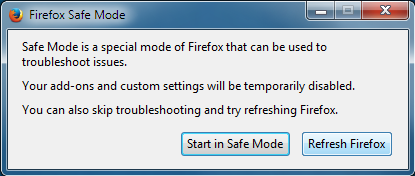
Firefox 61.0.1
Dear Whomever,
Isn’t it just grand that the almighty Firefox doesn’t work for all websites while Internet Explorer has no trouble or problems whatsoever?
A website I visit to pay bills is allstate.com, but almighty Firefox doesn’t allow one to “Log-In.” I also find it annoying that this current version is absolute garbage for “Add-Ons” in terms of finding a decent listing. As further concerns the subject of “Add-Ons” perhaps someone from almighty Mozilla could explain why “Adobe Reader” is not an option.
Respectfully,
Gregory P. Falasz
Tutte le risposte (1)
Hi Gregory, thought you would know that Adobe Reader DC is Proprietary Software and they have there own Website to Distribute it from as well as other products you maybe interested in finding more about and maybe purchase or talk to your Purchasing Agent or your Boss to be able to get the full blown Acrobat.
As Firefox Support Volunteers we do our best to try and accommodate all sorts of problem issues such as yours.
If you are having trouble searching for something on the Firefox add-on site please ask for help and let us know next time what you maybe looking for. https://addons.mozilla.org/firefox/extensions/
As for the problem of not being able to get to a website, there are many causes, some of them are caused by your own Security software like : like Avast/AVG, Kaspersky, BitDefender, Mcafee and ESET Or add-ons that you choose not to share information about when making this question.
So since no information on your Extensions please give this a try :
Try Firefox Safe Mode to TEST & see if the problem goes away. Firefox Safe Mode is a troubleshooting mode that temporarily turns off hardware acceleration, resets some settings, and disables add-ons (extensions and themes).
If Firefox is open, you can restart in Firefox Safe Mode from the Help menu:
- Click the menu button
 , click Help
, click Help  and select Restart with Add-ons Disabled.
and select Restart with Add-ons Disabled.
If Firefox is not running, you can start Firefox in Safe Mode as follows:
- On Windows: Hold the Shift key when you open the Firefox desktop or Start menu shortcut.
- On Mac: Hold the option key while starting Firefox.
- On Linux: Quit Firefox, go to your Terminal and run firefox -safe-mode
(you may need to specify the Firefox installation path e.g. /usr/lib/firefox)
When the Firefox Safe Mode window appears, select "Start in Safe Mode".
If the issue is not present in Firefox Safe Mode, your problem is probably caused by an extension, theme, or hardware acceleration. Please follow the steps in the Troubleshoot extensions, themes and hardware acceleration issues to solve common Firefox problems article to find the cause.
To exit Firefox Safe Mode, just close Firefox and wait a few seconds before opening Firefox for normal use again.
When you figure out what's causing your issues, please let us know. It might help others with the same problem.
If that did not work I see a Clean Install can at times fix issues like what you stated.
Certain Firefox problems can be solved by performing a Clean reinstall. This means you remove your Firefox program files and then reinstall Firefox. This process does not remove your Firefox profile data (such as bookmarks and passwords), since that information is stored in a different location.
To do a clean reinstall of Firefox, please follow these steps: Note: You might want to print these steps or view them in another browser.
- Download the latest Desktop version of Firefox from this page) and save the setup file to your computer.
- After the download finishes, close all Firefox windows (or open the Firefox menu
 and click the close button
and click the close button  ).
).
- Delete the Firefox installation folder, which is located in one of these locations, by default:
- Windows:
- C:\Program Files\Mozilla Firefox
- C:\Program Files (x86)\Mozilla Firefox
- Mac: Delete Firefox from the Applications folder.
- Linux: If you installed Firefox with the distro-based package manager, you should use the same way to uninstall it - see Install Firefox on Linux. If you downloaded and installed the binary package from the Firefox download page, simply remove the folder firefox in your home directory.
- Windows:
- Now, go ahead and reinstall Firefox:
- Double-click the downloaded installation file and go through the steps of the installation wizard.
- Once the wizard is finished, choose to directly open Firefox after clicking the Finish button.
More information about reinstalling Firefox can be found here.
WARNING: Do not use a third party uninstaller as part of this process. Doing so could permanently delete your Firefox profile data, including but not limited to, extensions, cache, cookies, bookmarks, personal settings and saved passwords. These cannot be easily recovered unless they have been backed up to an external device! See Back up and restore information in Firefox profiles.
Please report back to say if this helped you!
Modificato da Shadow110 il

